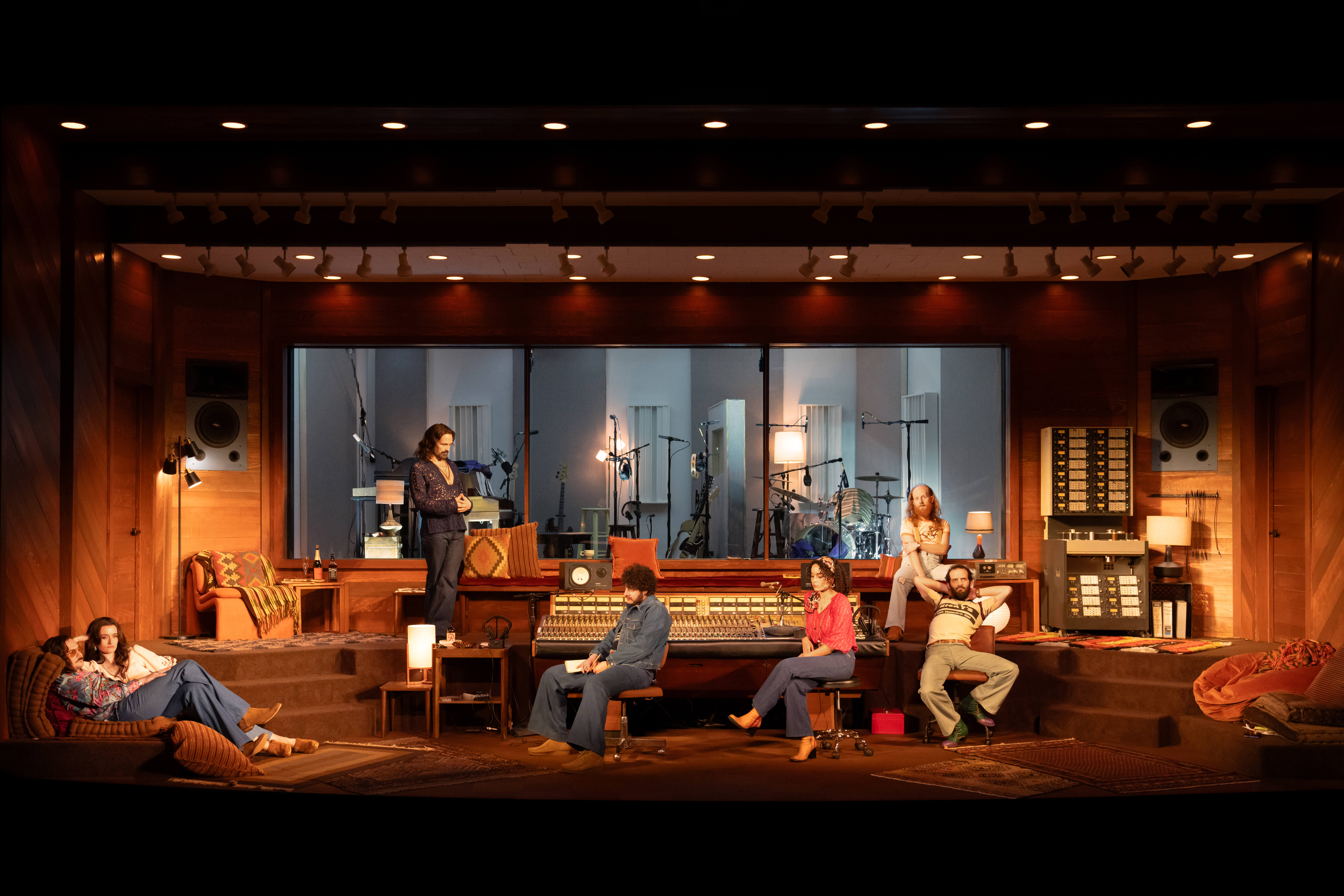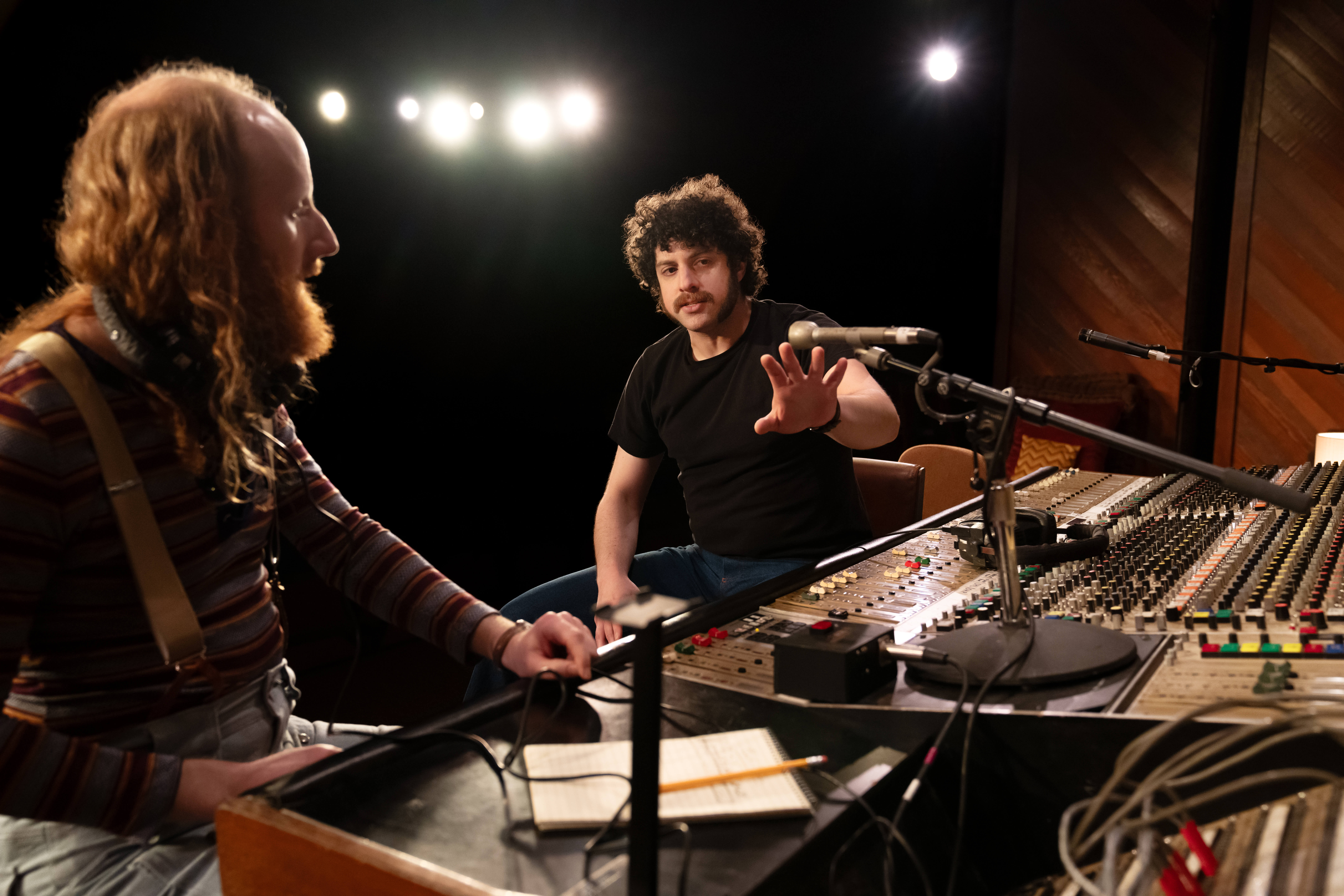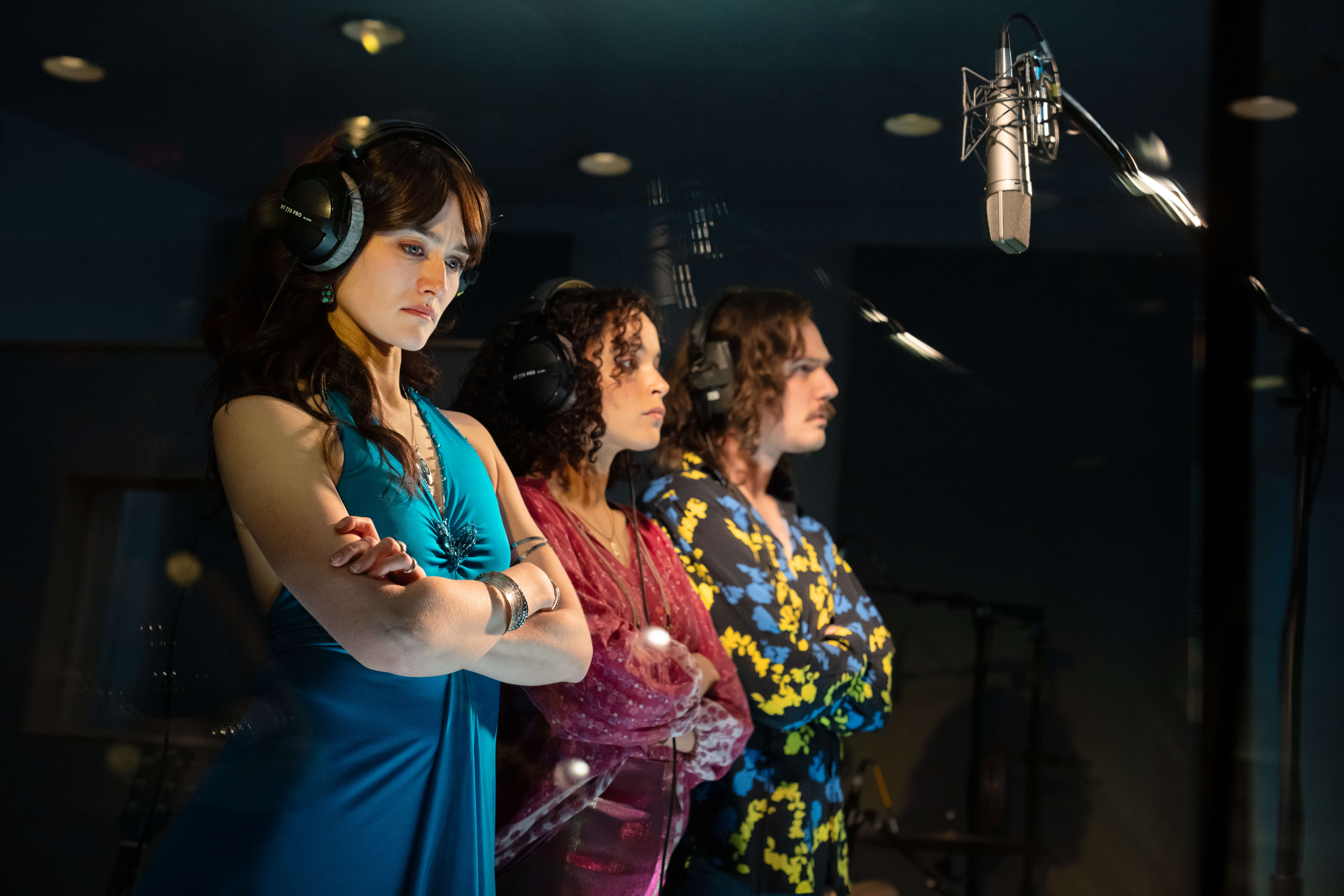‘It’s my family play.’ Tony winner David Adjmi talks ‘Stereophonic’
Adjmi’s play, nominated for 13 Tonys, is about a band’s tumultuous act of creation

The cast of David Adjmi’s Stereophonic. Photo by Julieta Cervantes
Editor’s note: David Adjmi’s Stereophonic won best play at the 2024 Tonys after a record-breaking number of nominations. To mark that achievement, we’re republishing this interview from April 2, before the play opened on Broadway.
There’s a moment in David Adjmi’s Stereophonic that heightens the pressure in the room.
The unnamed 1970s band at the play’s center, who bear more than a glancing resemblance to Fleetwood Mac, learn that Columbia Records has tripled their budget. In the words of their overwhelmed engineer Grover, “they’re getting more than Pink Floyd got for Dark Side of the Moon.”
In a way, art mirrors life. Adjmi’s play, set within the walls and partitions of a recording studio, received wall-to-wall raves last year Off-Broadway at Playwrights Horizons. Tonight it will begin previews at a much larger house: Broadway’s Golden Theatre.
“The whole thing is so meta,” Adjmi said of the transfer. “We’re all new to this. We’ve not worked in houses this big.”
Adjmi’s chief concern for the new venue was losing the intimacy of the piece, a raw look at relationships punctuated by live music written by Will Butler, formerly of Arcade Fire. But Adjmi’s confident that the Golden can deliver the same experience, just with “brighter hues.”
Stereophonic, with its hyper-naturalism, was something of a departure for Adjmi, who, with plays like 3C (a psychosexual dissection of Three’s Company) and Marie Antoinette (a modernized tour of Versailles’ excess) has often leaned into more stylized modes. Adjmi is also a celebrated memoirist, documenting his life in the Syrian Jewish community of Midwood in his book Lot Six.
Before Stereophonic, Adjmi said, he was almost retired from playwriting, only writing it to fulfill a grant.
“I thought, ‘All right, I’ll just do a one act play,’” he said. “But the one act play got bigger and bigger.”
Now three acts — mercilessly curated from hundreds more pages — Stereophonic was built with a company of talents specifically recruited for the play’s demanding needs, including Butler, director Daniel Aukin, arranger Justin Craig, scenic designer David Zinn and sound designer Ryan Rumery. The piece is about the agony and ecstasy of collaboration; Adjmi calls it his “family play.”
I spoke with Adjmi about his process, the offstage life of his band and a project he’s developing based on a real-life musical icon. The following conversation has been edited for length and clarity.
PJ Grisar: This came from you listening to Led Zeppelin on a plane. Can you tell me a little bit more about how you sort of landed on this idea?
David Adjmi: I don’t call them “ideas,” because they’re not really fully-fleshed notions. They’re more intuitions. My Spidey senses just go off. I have like an obsessive feeling. It’s like Gene Hackman at the end of The Conversation when he’s ripping apart his apartment. It’s this feeling of I have to unpack why I want to do this.

The emotions inside of this Led Zeppelin song and the feeling that that song traverses in the vocals was incredibly compelling to me. The song was called “Babe, I’m Gonna Leave You.” It’s a cover, but when he was singing, he was also communicating “Don’t ever leave me, please. I can’t live without you,” and also “Get away from me.” That duality felt very interesting. And then I imagined Robert Plant in the studio. Then suddenly, I got the idea for this as a set. I started imagining it almost like a sound installation. And I started thinking about the ways in which I can play with sound and the bifurcated space of the sound room and the control room, which of course I didn’t have the language to know what those words were, but I sort of knew enough to know. People have done plays that have been set in studios, but they hadn’t really explored the studio as a dramatic landscape.
People have observed that there’s a lot of superficial Fleetwood Mac connections — Brits, Americans, married couples.
I researched for many, many, many, many hours and in my research I looked at a lot of documentaries and videos online and VH1’s Behind the Music and I took a ton of notes. I don’t really censor myself when I’m in this kind of embryonic phase of it. And so it just crystallized around these things. One of the things that’s interesting about Fleetwood Mac besides the fact that they’re such an important band, and a great band, is the mythology around the romantic entanglements in that band. And so I’m sure that made its way into what I was doing, but it was unconscious.
Did you end up getting to shadow engineers for research or be in a studio?
I was too shy to ask Will to let me in on an Arcade Fire recording, but I feel like they wouldn’t have let me go. It’s too intimate. I wouldn’t want someone watching me, taking notes while I’m making a play. I had to do a lot of imagining and extrapolation. I would take phrases from the documentaries or from the readings, “Put more EQ on the amp,” or whatever they would say. And then I tried to see if I could interpolate it into a draft.
I met with a number of engineers, most prominently I worked with John Kilgore, who was Philip Glass’ engineer. He worked in the ‘70s, even though he didn’t work on this kind of music, but he knows the equipment and he understands what the process might look like. And so he could sort of help me go “That wouldn’t work”’ or ‘That person would need an assistant. And so you’d need to put someone else in the control room with him.” He would just kind of be my bullshit detector for the play and then it would completely change the direction. When John said Grover needs an assistant —
You get Charlie.
Yeah that gave me Charlie [played by actor Andrew R. Butler, no relation to Will] and then that gave me an entire new dialectic in the play, because now the engineers become almost like a chorus.
Tell me about this process with Will Butler and getting this music in.
We were all involved from day one, including Will, who I didn’t really know. He didn’t know me, he didn’t know my work. He just sort of did it as a leap of faith. And then it took me several years. I want to say at least three or four years, while he was off, you know, doing Arcade Fire albums and getting his masters at Harvard in public policy, which he did in the middle of all this. Crazy. So then I gave him this draft. And by that point, I started to understand, “I think it’s about five-ish songs. And we’re going to repeat them here.” We have to restrict the number of songs and I want to see things repeat over the course of the play in new iterations. I sort of marked them out in the text. And then we did a workshop and I showed him where I thought the songs would go.
I sort of gave indications like, “I think this song should feel this way. And I think this song needs to feel like this.” And then Will went off with the script and said, “Let me just do my Stanislavski thing where I go in these characters and try to write it as them.” It was a very collaborative process. And there are many songs that we didn’t end up using that are great songs, but they just didn’t quite fit the world of play or didn’t fit dramatically what was needed.
You’re creating these characters, but you’re letting him write the words that they are writing. Was it hard to let go of that?
Kind of, but I sort of knew that this was his province, and that I really respect him and I think he’s so talented. He was open enough to really collaborate with me and didn’t have an ego about it and say, “No, this is my artwork. And this is the song. You’re gonna have to just take it or leave it.” Will isn’t like that. He has a light touch. And so, for me that sort of relieved a lot of my anxieties around like, “Oh, this isn’t going to feel right in the play.” I think the songs do feel right.
In some ways the play is like a piece of music in itself, in terms of the timing of it and all the overlapping dialogue. How did you figure out the tempo?
That is more like me being a composer. I don’t do that in the room. It’s sort of inhuman what I’m asking the actors to do and I don’t want to get hamstrung by their actual human abilities. I created a kind of Olympian obstacle course. And I don’t know why I do it. I just had a conversation with Daniel the other day, my director, he said, “You’ve chosen a medium where things shift and change every night and yet you’re demanding this kind of extreme precision that is more intense and more granular than anything I’ve ever seen in theater ever.” I couldn’t tell you why I hear things a certain way, or why certain moments I think need to be really diffracted and hyper-scored. There are moments that are just pieces of music, where it just becomes a score and all of the characters become instruments momentarily and it gets extremely abstracted. And I just find it very pleasing. I think all the plays have this to a degree. But again, I’m just working off my intuitions.
Do you know the band’s name?
I don’t. I never gave them a name!
The idea goes back, like 11 years now but it came out on in the wake of the Peter Jackson Beatles documentary series Get Back. Do you have thoughts about that, because it feels like the culture was really primed for something like this.
When I heard about Get Back I had an anxiety attack. The show was supposed to happen during COVID. We were supposed to open in 2020. And, in a different production for a different theater. It had been so long up to then. And then I heard about Get Back and thought, “Oh, well. Now it’s already been done.” So I didn’t watch it, because it made me too nervous. But Get Back is really just an extension — I mean, it’s a very long extension — of these documentaries that I sort of looked at.

These musicians making stuff in rooms — it’s so fascinating to just see people invested in making their art together. I also think the tedium is really interesting. When I first came up with the idea, I thought “What am I gonna do? I’m just gonna have to sit with these people recording endlessly? Like how is that going to be a play.” But they also take breaks and do other things. They would be like the things that I do when I take a break in the middle of a rehearsal process, you know and we’re all just hanging around and those sorts of unimportant banal conversations become the fabric of the relationships that are being made as much as the creative things. I think Get Back is a great example even though I haven’t watched it yet.
I read a Playwrights Horizons chat you did where you said that Grover wasn’t Jewish. No one’s Jewish and no one’s gay. You’re both. Is there something to unpack there?
Well, clearly, Eli Gelb is so Jewish. He was so genius in the audition, I was like “But Grover’s not Jewish.” In my head I was like “Grover is not Jewish, Grover is not Jewish.” And then I was like, “But Eli is so Jewish.” And there’s no way around it. And then I thought “maybe he’s Jewish. Maybe he’s half.” I had to come up with a narrative because Eli is too good. I don’t want to not cast Eli.
I sort of was very proud of this idea that in the time where everyone’s writing their quote, unquote, identities, and fixating on their tribal identities that I just relieved myself of that completely. I was very proud of my heterosexual characters, cause I’m like, “This feels so true, and I don’t really hang out with these people.” But I don’t need to. It doesn’t have to be about me and this like narcissistic mirror. It is about my identity, but not in a way that I could have anticipated.
You kind of did your identity play already — Stunning.
And I’ll do it again if I want to. There’s nothing wrong with those kinds of plays. I think there’s a kind of valorization of that kind of play. That’s not any better or worse than any other kind of play and I think now people feel this pressure to produce and write those kinds of plays as part of a moral agenda. And I find that moral agenda kind of specious.
How did it end up reflecting your identity? Your identity as an artist?
It’s multi-pronged. But I think that yes, it is about my identity as an artist. And I also think it is autobiographical . It has elements of my family and stuff in there that was unconscious. I didn’t know that. In a way, this is my family play. But I concealed it for myself so that I could write it.
We know that the band have this huge budget, and you get the sense maybe they’ve got session players and stuff. Are they doing Pet Sounds offstage that we don’t see?
There’s so many offstage characters. I know who a lot of them are because I created them. There’s roadies, and there’s a ton of people there. And people who come and visit that, of course can’t be in the play, but I know who they are.
Are any of them real people?
Who’s the guy from The Band — they’re friends with him.
Robbie Robertson?
No, not him.
Levon Helm.
Levon! Levon was there. And also, the main guy from ELO and his engineer’s hanging out with them too. I have like a kind of universe that I built around this play that is insanely, crazily specific. It’s weird!

I like that basically all of the songs we hear we find out at the end were cut from the album.
That was also a gift to Will, because it’s sort of like, people were asking us with early interviews like, “Will — how did you deal with this pressure to make this great album?” And I’m thinking, “We don’t know what songs got put on this album.” This is the process. I just wanted to relieve Will of that even though I think the songs are great.
Do you know what happens beyond this for them?
I have it all mapped out through the ’80s for them in my head. MTV and stuff and the thing that I’m most interested in in terms of what happens after is the relationship between Grover and Peter. Peter’s the lead singer and Grover’s the engineer and they have a very tormented relationship. But I actually think that they double each other and I think they’re the same person.
I’m interested in thinking about how these power relationships kind of turn upside down. Like Lila Neugebauer, who I’m working with right now on another project, I was on the committee to give her a grant at the beginning of her career. To see Lila’s ascension is so fascinating to me, and I’m like, “Wait a minute. She was this kid doing this proposal for a grant at the Drama League!”
Can you tell me a bit about that project?
It’s been going on for years. You know, we sort of pitched it to Universal during COVID and it’s really Lila’s idea, it’s Lila’s baby and she brought me on, but it’s a play about Brian Wilson abandoning the Smile album. That becomes his Rosebud in the play, like Citizen Kane. We’re going to use music from Brian’s and the Beach Boys’ catalog, but it won’t be a jukebox musical. It’s not quite like Stereophonic, but pushing the idea of what a musical is to another degree.





















